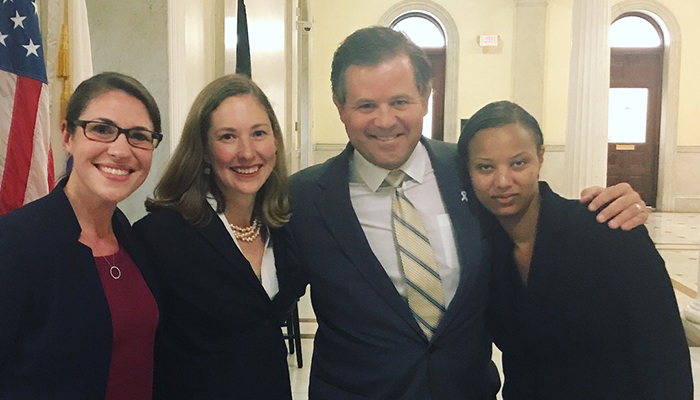Julie Dahlstrom Testifies before Massachusetts Judiciary Committee
Director of the Immigrants’ Rights & Human Trafficking Program advocated for legislation to help victims of human trafficking vacate convictions.

Clinical Associate Professor Julie Dahlstrom, director of BU Law’s Immigrants’ Rights and Human Trafficking Program, recently testified before the Massachusetts Joint Committee on the Judiciary in support of House Bill 766, An Act to Reduce Sexual Exploitation of Victims of Human Trafficking. The bill establishes a more efficient path for survivors of human trafficking to vacate past criminal records related to their victimization. Dahlstrom testified with Attorney Lavinia Weizel from Mintz Levin, and Asia Graves, a survivor of sex trafficking.
In 2016, BU Law partnered with Mintz Levin, the EVA Center, and other advocates to draft the bill, which was filed by Representative Michael S. Day, D-Stoneham, on January 18, 2017. The bill enables survivors of human trafficking to file a motion to vacate certain criminal convictions—such as solicitation, sex for fee, and common night walking—if they can show that the conviction was a result of their victimization. In support of the motion, “official documentation” from a government agency will establish a rebuttable presumption that any prostitution-related offense was a result of victimization, reducing the need for extensive victim testimony and the potential for re-victimization.
“When survivors exit exploitation, their criminal record often stays with them, haunting them long after they have left the trafficking situation,” Dahlstrom says.“They may face the denial of employment, permanent housing, or other basic benefits in addition to the stigma associated with certain crimes—such as sex for fee. This bill will remedy this by establishing a streamlined process to vacate certain criminal convictions.”
BU Law has worked closely with Mintz Levin to advocate in support of the vacatur bill. “For survivors of sex trafficking who were forced to commit prostitution-related crimes in Massachusetts, the procedure for vacating those convictions is complicated, time consuming, and there is no guarantee of success,” says Lavinia Weizel, an attorney at the law firm Mintz Levin, who also testified in support of the bill. “The complexity of the process under existing Massachusetts law makes post-conviction relief seem out of reach for most survivors.”
Thirty-two states currently have trafficking-related vacatur provisions, including Connecticut, New Hampshire, New Jersey, New York, Pennsylvania, Vermont, California, Kentucky, and Oklahoma. While Massachusetts passed comprehensive state trafficking legislation in 2011, the law did not include a trafficking-related vacatur provision.
Related News
- Karen Pita Loor Testifies before Mass. Joint Committee on Public Safety and Homeland Security
- BU Law Students’ Amicus Examines Constitutionality of Immigration Detainers
- Human Trafficking Clinic Receives Grant to Combat Commercial Exploitation of Children